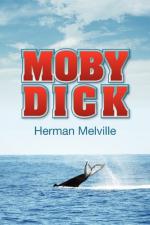|
This section contains 748 words (approx. 3 pages at 300 words per page) |

|
Spiritual and Moral Reassessment in Moby-Dick
Summary: The conclusion of Herman Melville's novel Moby-Dick is more than just the end of Ahab's chase for the elusive white whale and the deaths of Ahab and his crew. It is also the beginning of the spiritual and moral reconciliation within both Ahab and the reader.
In Herman Melville's novel, Moby-Dick, Ahab struggle to capture the elusive white whale leads up to the moments when Ahab realizes that God is not flawless, his deep sense of isolation, and how good and evil are not absolutes. Ahab changes his ideals about himself and God in the ending of Moby-Dick through his spiritual reassessment and moral reconciliation.
At the end of the novel, Ahab finally realizes that God is not a perfect being, but instead just like Ahab, He too has huge flaws and virtues. For Ahab, one of "[God's] mighty, earthly marchings, ever cullest [His] selectest champions from the kingly commons" was created in the image of God (151). Yet this "grand, ungodly, god-like man, Captain Ahab" has a hamartia of monomania, thus so too does God have failings (112). For this omniscent, omnipresent, all-loving God "saw'st the murdered mate when tossed by pirates from the midnight...
|
This section contains 748 words (approx. 3 pages at 300 words per page) |

|


